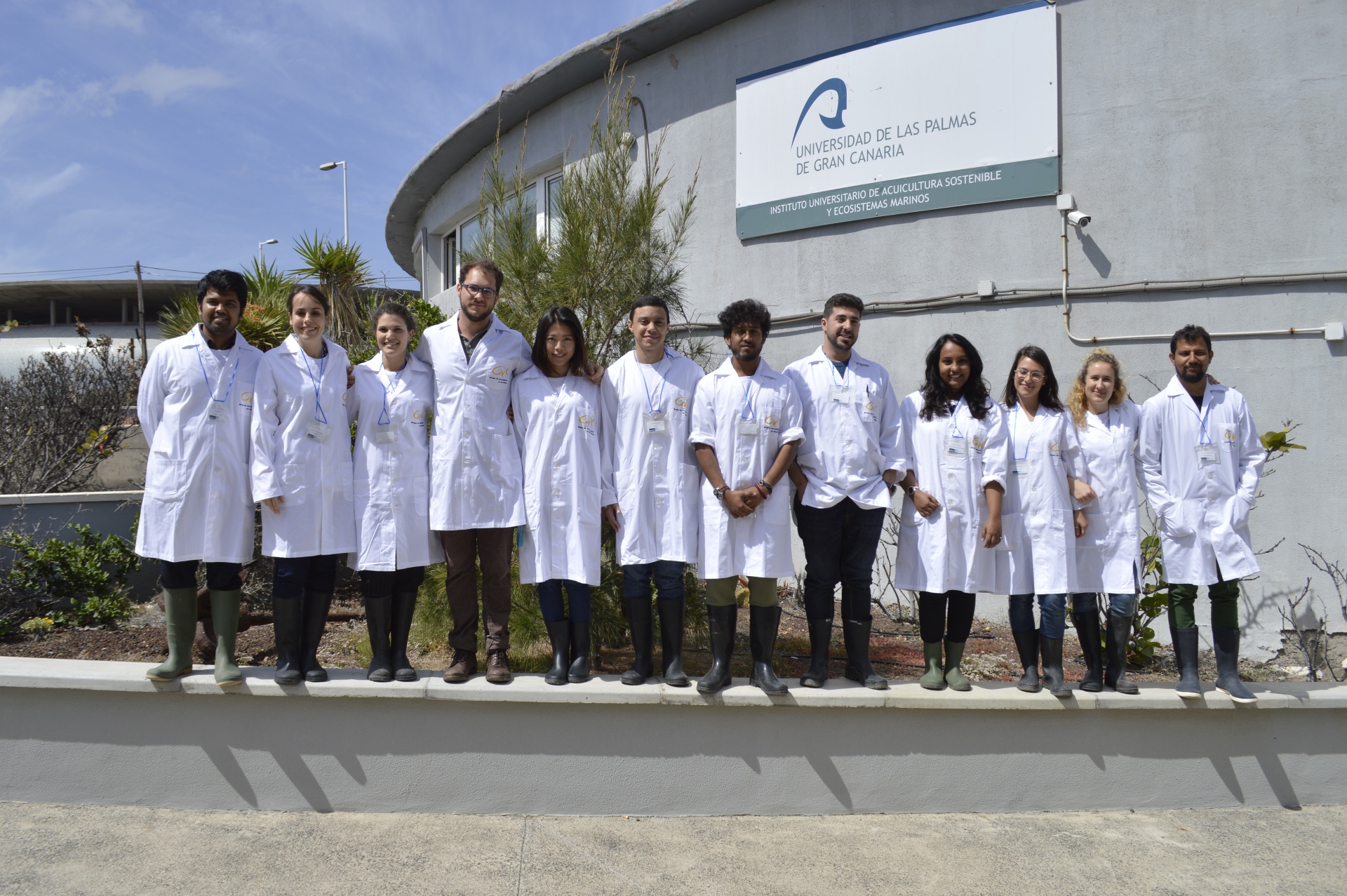Four researchers from the ULPGC successfully establish the optimal levels for the supplementation of vitamins and minerals in the diets of sea bream larvae and juveniles, which allows the successful completion of the European project BioMedaqu after three years of work around the world, combining skeletal biological research of aquaculture species with biomedical and human models
The Institute for Research in Sustainable Aquaculture and Marine Ecosystems (ECOAQUA) of the University of Las Palmas de Gran Canaria (ULPGC), has presented the most relevant results of four young researchers who have completed their doctoral studies in the framework of an ambitious European project called BiomedAqu, which finished at the end of January after three years of research around the world combining skeletal biology of aquaculture species with biomedical and human models.
The ULPGC students' research has determined the consumer preferences in aquaculture products, as well as the economic impacts of severe skeletal anomalies in Mediterranean sea bream and sea bass farms, which could reach almost 90 million euros annually, and the optimal conditions for sea bream culture to reduce the prevalence of such anomalies, determining that the density and volume of the culture are fundamental in the development of deformities in this species.

Example of skeletal anomalies in sea bream.
The discoveries of these scientists, who are integrated in the Aquaculture Research Group (GIA) of ECOAQUA, highlights the demonstration of safe levels for vitamin D supplementation and optimal levels for vitamin K, as well as for the supplementation of minerals such as selenium, copper, zinc or manganese in the feed used in the diets of sea bream larvae (Sparus aurata) and, in the case of juveniles, of zinc and vitamins K and D.
The alterations in the expression of bone biomarkers and calcium regulators caused by vitamin D and K mismatches or the perceived risks and risk management practices of European aquaculture companies are other results obtained by the four researchers who have completed their doctoral degrees in the Sustainable Aquaculture and Marine Ecosystems program (ACUISEMAR) at the ULPGC in the framework of the BiomedAqu project: Javier Castillo, native to Colombia; Zachary Dellacqua, American; Yiyen Tseng, from Taiwan; and Sivagurunathan Ulaganathan, from India.
The young researchers have worked under the supervision of María Soledad Izquierdo, Daniel Montero Vítores and David Domínguez Montesdeoca, from the Aquaculture Research Group (GIA) of the University Institute ECOAQUA, as well as Juan Carlos Martín Hernández, professor of Applied Economic Analysis at the ULPGC, who is a member of the BiomedAqu scientific committee.
A project that has involved 15 researchers for 3 years
Researchers from all over the world have been involved for 36 months in BiomedAqu, which has served to build an innovative experience by combining research in skeletal biology of aquaculture fish species with biomedical and human models. These advances on skeletal anomalies in fish such as sea bream may be transferable in the future to the study of skeletal anomalies in humans, using fish as experimental models.
This research could be related to advances in pathologies such as osteoporosis and osteoarthritis, chronic, degenerative diseases that cause pain and progressive functional limitation.
Although it is not well known, the progress in many areas of biomedical research is based on the use of different species of fish as models, due to the high similarity between their genome and that of human. The biological characteristics of these fish, which do not age, make them ideal models for studying diseases such as Alzheimer's, Parkinson's, cancer or cardiac deficiencies, as well as guinea pigs in the field of regenerative medicine.
With a budget of almost 665,000 euros, the BiomedAqu project is funded by the European Union (EU) and is part of the Marie Sklodowska-Curie Innovative Training Network (MCSA-ITN), a program of pre-doctoral contracts of great international prestige whose arrival at the ULPGC and the University Institute ECOAQUA is a milestone in the field of university cooperation.
 Yiyen Tseng, researcher of the project.
Yiyen Tseng, researcher of the project.
The University Institute ECOAQUA of the ULPGC has been part of the total of 18 institutions, among universities, research centers, associations of aquaculture farms and feed producers, as well as hospitals and biotechnology companies, which have formed the international consortium in charge of the project.
This is an initiative through which 15 young researchers (seven women and eight men) of 10 different nationalities have received training and have obtained their doctoral degrees at the universities associated with the project, after having the opportunity to complete research stays in different institutions of the consortium.
The results generated at the ULPGC in the course of the BiomedAqu project have been shared not only among the participating institutions through workshops and meetings, but also to a general public, including members of the industry, researchers and students.
The closing conference, in which more than 30 international researchers from all sectors of aquaculture participated in online format, was attended by David Domínguez, Sivagurunathan Ulaganathan, Javier Cantillo, Yiyen Tseng and Zachary Dellacqua, who presented the most relevant results, previously described, achieved throughout their research as a result of their doctoral studies within the framework of the European initiative.
Press office: Beatriz Díaz – beatriz@mandarinacomunicacion.es – 620410871
If you want to know more about BiomedAqu and the researchers who have been involved in the project, visit our website


